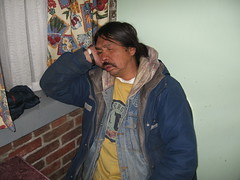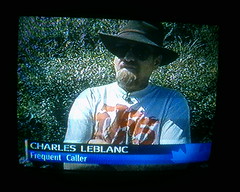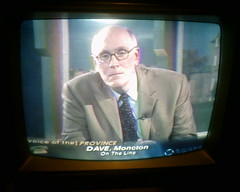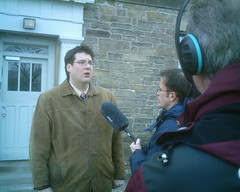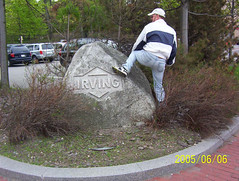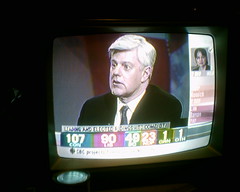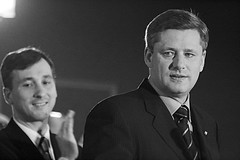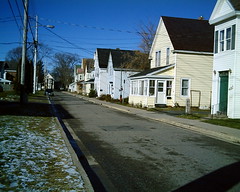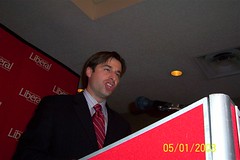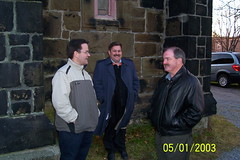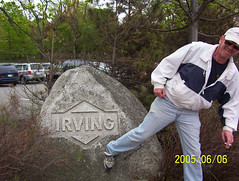
Saturday, December 09, 2006
I believe Kelly Lamrock will find it much harder now his party is in power!!!
This was taken last year in front of the Opposition building!!!
Repsol doesn't have the gas???
Charles,
This may mean that Repsol doesn't have the gas they thought they would have....a bit of good news don't ya think ?
http://www.mineweb.net/energy/409491.htm
Russia’s LNG strategy runs into opposition
By: John Helmer
Posted: '13-NOV-06 09:00' GMT © Mineweb 1997-2006
MOSCOW (Mineweb.com) --There are three opponents of Russia's strategy to become a global LNG exporter -- the Western Gray Whale, the US Government, and Gazprom.
For the time being, and for quite different reasons, all three, including the LNG producer itself, Gazprom, have succeeded in delaying and redirecting plans to start shipments from the first of Russia's LNG plants at Aniva Bay on Sakhalin Island, in the Fareast; and to postpone indefinitely drawing-board plans and joint venture agreements to build the second and third LNG plants on the Baltic, and to the north, on the Barents Sea.
During the Soviet period, energy planners in Moscow concentrated on piping natural gas to domestic users, and for export westwards by pipeline across land to Europe. At the consumer end of this pipeline system, reliance on Russian gas is currently 100% in Finland; 99% in Bulgaria; 97% in Slovakia; and 76% Greece. In volume of Russian gas consumption, Germany takes most, followed by Italy, Turkey and France. In the Soviet period, the technology for liquefaction was costly, and although in development by Soviet ally Algeria, Moscow believed there was no pressing economic reason for installing it.
The energy price boom of the past three years has created enormous cash reserves for Gazprom, which the Kremlin-directed management wants invested as quickly as possible, avoiding devaluation by the unstable dollar, and threatened market manipulation by the Americans and West Europeans. That has meant increasing interest on Gazprom's part in diversifying upstream, as well as downstream, in the gas market.
Shell had started the ball rolling, a decade ago, with its plan to build the Aniva Bay plant to liquefy gas, and tanker it to Japan and South Korea. With 9.6 million-tons in annual export capacity, this plant has already contracted to sell more than 7 million tons for 20 years to Japanese and Korean buyers.
However, a combination of huge cost-overruns, postponements of tax payments to the Russian treasury, and environmental damage led the Kremlin to attempt a move this year to transfer operating control, and shareholding equity in the project, to Gazprom. For the time being, Asian buyers cannot count on a whiff, or a drop, of gas from Sakhalin.
The campaign to protect the whales by Russian environmental organizations -- endorsed by regional court rulings -- has been under way for several years. Royal Dutch Shell, controlling shareholder and operator of the Sakhalin-2 project has repeatedly denied that its dredging, construction of offshore production platforms and a tanker berthing jetty, and the laying of undersea pipelines had upset the marine ecology in the Sea of Okhotsk. Starting in 2005, the Russian courts began to disagree.
This year, the federal authorities extended their criticism to onshore pipeline construction, the cutting of forest, the heightened threat of mudslides, and other problems. After suspending the project's environmental clearances, the deputy head of the Russian environmental protection agency Rospriradnadzor, Oleg Mitvol, said Shell's proposed new clean-up plan was worthless. "It is not serious. It is a joke collection. We had expected to see technical solutions and they are dealing with small local problems," Mitvol said during a site inspection on November 11.
The changing economics of gas exports persuaded Gazprom strategists in Moscow that they too should build their own LNG facilities. Accordingly, during 2006, Gazprom negotiated agreements with Algeria's Sonatrach to cooperate in developing these plants in Russia for export of the product to the North American market.
Natalia Bortsova, a gas industry analyst in Moscow, told Mineweb: "Gazprom has a serious intention to produce LNG, but currently has no production facilities of its own." She said the technology required is readily available, and Sonatrach has unique experience building LNG plants, operating them, and marketing the product.
"Sakhalin LNG is controlled by Shell, and Gazprom has been trying to get a share there without success yet. [An LNG project for St.Petersburg involves] PetroCanada and Gazprom, but the negotiations are still in stage of memorandum of intentions." She acknowledged that Gazprom's desire to export LNG to the US market will run into potential competition with Sonatrach, already a major US supplier, unless the two companies agree to cooperate. "It is very important to create the partnership, not to compete," Bortsova said.
The Bush Administration has objected that a Gazprom-Sonatrach combination threatens gas markets with the potential for cartel pricing. But the Americans were unable to dissuade Sonatrach from signing its MoU with Gazprom.
At the same time, the Kremlin was persuaded to rethink the usefulness of allowing US partners to take equity and possibly operational control of the northwestern LNG plants in planning -- one on the shore of the Gulf of Finland, near St. Petersburg, in partnership with Petro-Canada; and another on the Barents Sea coast, above the Arctic Circle, with US oil companies, ChevronTexaco and ConocoPhillips.
According to the statement by Petro-Canada on October 12, 2004, Petro-Canada’s CEO Ron Brenneman, and Gazprom’s Chairman, Alexey Miller had signed a Memorandum of Understanding (MOU) "to investigate a joint liquefied natural gas (LNG) project which would see LNG from Russia shipped to North American markets by 2009. Specifically, the MOU covers options for Petro-Canada and Gazprom to jointly develop a liquefaction plant in the St. Petersburg region, and investigate options for gas supplies to that LNG plant and re-gasification in North America."
Without a supply of gas on tap, however, that deal is a dead letter.
Thus, the decision Gazprom made on October 9 this year -- two years after the Petro-Canada MoU -- to limit initial production from the Shtokman field to pipeline deliveries of natural gas could defer the Baltic plant indefinitely. According to the Gazprom announcement, "pipeline gas deliveries from the Shtokman field to the European market would take priority over LNG shipments. Shtokman will be the resource base for Russian gas export to Europe via the Nord Stream gas pipeline. Gazprom will develop the field on its own, without attracting foreign partners.”
The latest Gazprom evaluation of Shtokman boosted field reserves by 10-percent to over 4 trillion cubic metres. It also concluded that lifting the gas and condensate, and piping it 550 kilometres to shore, will be less risky, and less costly, than Gazprom has previously thought. The political value, however, of liquefying the gas, either on the Barents shore, or on the Gulf of Finland, has vanished, at least for the time being -- and Russia will leave the American LNG market to Sonatrach for the foreseeable future.
The China market remains difficult for Gazprom to supply, unless it can divert Sakhalin gas away from its intended Japanese and Korean contract customers. A fresh engineering estimate, released last week, suggests that the cost of building overland the proposed Altai gas pipeline over 2,700-km from West Siberia to China would require an investment of around $14 billion. Even if that is affordable, Gazprom's ambition to place large volumes of gas in the Chinese market as early as 2010 may be defeated by lack of gas. "We do not think that Gazprom has the gas for this, at least from West Siberia," comments Adam Landes, a Renaissance Capital analyst. "We therefore continue to believe that Russian gas exports to Asia will be sourced from East Siberia and Sakhalin only, and dismiss the notion that the Altai pipeline will ever be built."
Mineweb always carries details of at least 20 independently written top mining, mining finance, metals and mining sector analysis articles on its homepage as well as a fast news feed to keep you right up to date with what is going on in the mining and metals sectors worldwide. These are continuously updated through the day. Click here to go to Mineweb's home page and access the latest news and comments on developments in mining and metals worldwide.
This may mean that Repsol doesn't have the gas they thought they would have....a bit of good news don't ya think ?
http://www.mineweb.net/energy/409491.htm
Russia’s LNG strategy runs into opposition
By: John Helmer
Posted: '13-NOV-06 09:00' GMT © Mineweb 1997-2006
MOSCOW (Mineweb.com) --There are three opponents of Russia's strategy to become a global LNG exporter -- the Western Gray Whale, the US Government, and Gazprom.
For the time being, and for quite different reasons, all three, including the LNG producer itself, Gazprom, have succeeded in delaying and redirecting plans to start shipments from the first of Russia's LNG plants at Aniva Bay on Sakhalin Island, in the Fareast; and to postpone indefinitely drawing-board plans and joint venture agreements to build the second and third LNG plants on the Baltic, and to the north, on the Barents Sea.
During the Soviet period, energy planners in Moscow concentrated on piping natural gas to domestic users, and for export westwards by pipeline across land to Europe. At the consumer end of this pipeline system, reliance on Russian gas is currently 100% in Finland; 99% in Bulgaria; 97% in Slovakia; and 76% Greece. In volume of Russian gas consumption, Germany takes most, followed by Italy, Turkey and France. In the Soviet period, the technology for liquefaction was costly, and although in development by Soviet ally Algeria, Moscow believed there was no pressing economic reason for installing it.
The energy price boom of the past three years has created enormous cash reserves for Gazprom, which the Kremlin-directed management wants invested as quickly as possible, avoiding devaluation by the unstable dollar, and threatened market manipulation by the Americans and West Europeans. That has meant increasing interest on Gazprom's part in diversifying upstream, as well as downstream, in the gas market.
Shell had started the ball rolling, a decade ago, with its plan to build the Aniva Bay plant to liquefy gas, and tanker it to Japan and South Korea. With 9.6 million-tons in annual export capacity, this plant has already contracted to sell more than 7 million tons for 20 years to Japanese and Korean buyers.
However, a combination of huge cost-overruns, postponements of tax payments to the Russian treasury, and environmental damage led the Kremlin to attempt a move this year to transfer operating control, and shareholding equity in the project, to Gazprom. For the time being, Asian buyers cannot count on a whiff, or a drop, of gas from Sakhalin.
The campaign to protect the whales by Russian environmental organizations -- endorsed by regional court rulings -- has been under way for several years. Royal Dutch Shell, controlling shareholder and operator of the Sakhalin-2 project has repeatedly denied that its dredging, construction of offshore production platforms and a tanker berthing jetty, and the laying of undersea pipelines had upset the marine ecology in the Sea of Okhotsk. Starting in 2005, the Russian courts began to disagree.
This year, the federal authorities extended their criticism to onshore pipeline construction, the cutting of forest, the heightened threat of mudslides, and other problems. After suspending the project's environmental clearances, the deputy head of the Russian environmental protection agency Rospriradnadzor, Oleg Mitvol, said Shell's proposed new clean-up plan was worthless. "It is not serious. It is a joke collection. We had expected to see technical solutions and they are dealing with small local problems," Mitvol said during a site inspection on November 11.
The changing economics of gas exports persuaded Gazprom strategists in Moscow that they too should build their own LNG facilities. Accordingly, during 2006, Gazprom negotiated agreements with Algeria's Sonatrach to cooperate in developing these plants in Russia for export of the product to the North American market.
Natalia Bortsova, a gas industry analyst in Moscow, told Mineweb: "Gazprom has a serious intention to produce LNG, but currently has no production facilities of its own." She said the technology required is readily available, and Sonatrach has unique experience building LNG plants, operating them, and marketing the product.
"Sakhalin LNG is controlled by Shell, and Gazprom has been trying to get a share there without success yet. [An LNG project for St.Petersburg involves] PetroCanada and Gazprom, but the negotiations are still in stage of memorandum of intentions." She acknowledged that Gazprom's desire to export LNG to the US market will run into potential competition with Sonatrach, already a major US supplier, unless the two companies agree to cooperate. "It is very important to create the partnership, not to compete," Bortsova said.
The Bush Administration has objected that a Gazprom-Sonatrach combination threatens gas markets with the potential for cartel pricing. But the Americans were unable to dissuade Sonatrach from signing its MoU with Gazprom.
At the same time, the Kremlin was persuaded to rethink the usefulness of allowing US partners to take equity and possibly operational control of the northwestern LNG plants in planning -- one on the shore of the Gulf of Finland, near St. Petersburg, in partnership with Petro-Canada; and another on the Barents Sea coast, above the Arctic Circle, with US oil companies, ChevronTexaco and ConocoPhillips.
According to the statement by Petro-Canada on October 12, 2004, Petro-Canada’s CEO Ron Brenneman, and Gazprom’s Chairman, Alexey Miller had signed a Memorandum of Understanding (MOU) "to investigate a joint liquefied natural gas (LNG) project which would see LNG from Russia shipped to North American markets by 2009. Specifically, the MOU covers options for Petro-Canada and Gazprom to jointly develop a liquefaction plant in the St. Petersburg region, and investigate options for gas supplies to that LNG plant and re-gasification in North America."
Without a supply of gas on tap, however, that deal is a dead letter.
Thus, the decision Gazprom made on October 9 this year -- two years after the Petro-Canada MoU -- to limit initial production from the Shtokman field to pipeline deliveries of natural gas could defer the Baltic plant indefinitely. According to the Gazprom announcement, "pipeline gas deliveries from the Shtokman field to the European market would take priority over LNG shipments. Shtokman will be the resource base for Russian gas export to Europe via the Nord Stream gas pipeline. Gazprom will develop the field on its own, without attracting foreign partners.”
The latest Gazprom evaluation of Shtokman boosted field reserves by 10-percent to over 4 trillion cubic metres. It also concluded that lifting the gas and condensate, and piping it 550 kilometres to shore, will be less risky, and less costly, than Gazprom has previously thought. The political value, however, of liquefying the gas, either on the Barents shore, or on the Gulf of Finland, has vanished, at least for the time being -- and Russia will leave the American LNG market to Sonatrach for the foreseeable future.
The China market remains difficult for Gazprom to supply, unless it can divert Sakhalin gas away from its intended Japanese and Korean contract customers. A fresh engineering estimate, released last week, suggests that the cost of building overland the proposed Altai gas pipeline over 2,700-km from West Siberia to China would require an investment of around $14 billion. Even if that is affordable, Gazprom's ambition to place large volumes of gas in the Chinese market as early as 2010 may be defeated by lack of gas. "We do not think that Gazprom has the gas for this, at least from West Siberia," comments Adam Landes, a Renaissance Capital analyst. "We therefore continue to believe that Russian gas exports to Asia will be sourced from East Siberia and Sakhalin only, and dismiss the notion that the Altai pipeline will ever be built."
Mineweb always carries details of at least 20 independently written top mining, mining finance, metals and mining sector analysis articles on its homepage as well as a fast news feed to keep you right up to date with what is going on in the mining and metals sectors worldwide. These are continuously updated through the day. Click here to go to Mineweb's home page and access the latest news and comments on developments in mining and metals worldwide.
Deja vu???
Charles, you have to print this, its from www.davidwcampbell.com
Cooking with the books
I must be getting old.
But I have this overwhelming feeling of deja vu.
The year 1999. The setting - right after the provincial election. The firm: Grant Thornton. The objective: do a 'real' audit of the books to see just how bad things really are.
Fast forward to 2006. Audit, Grant Thornton. Just how bad things really are.
In 1999, GT reported that the government was actually running a huge deficit (I seem to recall $200M+ but because of accounting practices were showing balanced books).
Also, funny thing, the first Lord government budget was fully balanced - despite the GT audit findings -and with no major program cuts. I didn't explore in great detail at the time, but I assumed that Lord and the boys either didn't change the accounting practices of the Libs or came up with creative ones of their own.
Now in 2006, we will get the same exact thing. The Tories were cooking the books. The fiscal situation is bad.
I haven't seen the audit but, again with age, I grow more and more skeptical of the political games people play.
The NB government has a thorough process in place to ensure the accountability of the books. They are audited, there is an auditor general, one would hope the media is keeping a watchful eye, etc.
I have no doubt that what was said/done in 1999 will be repeated in 2006. Big 'real' deficit followed by a balanced budget anyway.
If Graham wants to cancel the stupid, completely politically motived and designed to cover over incompetence in energy policy and actions HST rebate on electricity (albeit lucrative for me and my 100 year old home), he should. But he shouldn't play games with people.
When it comes to the provincial books, its a shadowy world to the average citizen as it is. Don't make it worse by confusing people with different accounting mechanisms, reporting mechanisms, etc. Let the Auditor General do his/her job (as when Wilson chastised Lord for certain creative 'accounting' back in 2001). But he/she is in the best position to be fair and accurate about that stuff.
Cooking with the books
I must be getting old.
But I have this overwhelming feeling of deja vu.
The year 1999. The setting - right after the provincial election. The firm: Grant Thornton. The objective: do a 'real' audit of the books to see just how bad things really are.
Fast forward to 2006. Audit, Grant Thornton. Just how bad things really are.
In 1999, GT reported that the government was actually running a huge deficit (I seem to recall $200M+ but because of accounting practices were showing balanced books).
Also, funny thing, the first Lord government budget was fully balanced - despite the GT audit findings -and with no major program cuts. I didn't explore in great detail at the time, but I assumed that Lord and the boys either didn't change the accounting practices of the Libs or came up with creative ones of their own.
Now in 2006, we will get the same exact thing. The Tories were cooking the books. The fiscal situation is bad.
I haven't seen the audit but, again with age, I grow more and more skeptical of the political games people play.
The NB government has a thorough process in place to ensure the accountability of the books. They are audited, there is an auditor general, one would hope the media is keeping a watchful eye, etc.
I have no doubt that what was said/done in 1999 will be repeated in 2006. Big 'real' deficit followed by a balanced budget anyway.
If Graham wants to cancel the stupid, completely politically motived and designed to cover over incompetence in energy policy and actions HST rebate on electricity (albeit lucrative for me and my 100 year old home), he should. But he shouldn't play games with people.
When it comes to the provincial books, its a shadowy world to the average citizen as it is. Don't make it worse by confusing people with different accounting mechanisms, reporting mechanisms, etc. Let the Auditor General do his/her job (as when Wilson chastised Lord for certain creative 'accounting' back in 2001). But he/she is in the best position to be fair and accurate about that stuff.
Is this true???
The richest 1% of adults in the world own 40% of the planet's wealth, according to the largest study yet of wealth distribution. The report also finds that those in financial services and the internet sectors predominate among the super rich.
Europe, the US and some Asia Pacific nations account for most of the extremely wealthy. More than a third live in the US. Japan accounts for 27% of the total, the UK for 6% and France for 5%.
The UK is also third in terms of per capita wealth. UK residents are found to have on average $127,000 (£64,000) each in assets, with Japanese and American citizens having, respectively, $181,000 and $144,000. All data relate to the year 2000.
The global study - from the World Institute for Development Economics Research of the United Nations - is the first to chart wealth distribution in every country as opposed to just income, for which more comprehensive date is available. It included all the most significant components of household wealth, including financial assets and debts, land, buildings and other tangible property. Together these total $125 trillion globally.
Anthony Shorrocks, director of the research institute at the United Nations University, in New York, led the study. He affirmed that the existence of a nest egg provided an insurance policy that helped people cope with unforeseen events such as ill health or a lost job. Capital allowed people to drag themselves out of poverty, he added. "In some ways, wealth is more important to people in poorer countries than in richer countries." It was more difficult in developing countries to set up a business because it was harder to borrow start-up funds, he said.
His team used detailed data from 38 countries, but had to rely on incomplete information from the rest.
The report found the richest 10% of adults accounted for 85% of the world total of global assets. Half the world's adult population, however, owned barely 1% of global wealth. Near the bottom of the list were India, with per capita wealth of $1,100, and Indonesia with assets per head of $1,400.
Many African nations as well as North Korea and the poorer Asia Pacific nations were places where the worst off lived.
"These levels of inequality are grotesque," said Duncan Green, head of research at Oxfam. "It is impossible to justify such vast wealth when 800 million people go to bed hungry every night. The good news is that redistribution would only have to be relatively small. Such are the vast assets of the rich that giving up a small part of their wealth could transform the lives of millions."
Madsen Pirie, director of the Adam Smith Institute, a free-market thinktank, disagreed that distribution of global wealth was unfair. He said: "The implicit assumption behind this is that there is a supply of wealth in the world and some people have too much of that supply. In fact wealth is a dynamic, it is constantly created. We should not be asking who in the past has created wealth and how can we get it off them." He said that instead the question should be how more and more people could create wealth.
Ruth Lea, director of the Centre for Policy Studies, a thinkthank set up by Margaret Thatcher, said that although she supported the goal of making poverty history she did not think increasing aid to poorer countries was the answer. "It's no use throwing lots of aid at countries that are basically dysfunctional," she said.
The UN report was issued as the Swiss magazine Bilan released a list of the richest Swiss residents. Ingvar Kamprad, the founder of Ikea, topped the list with an estimated fortune of $21bn
Europe, the US and some Asia Pacific nations account for most of the extremely wealthy. More than a third live in the US. Japan accounts for 27% of the total, the UK for 6% and France for 5%.
The UK is also third in terms of per capita wealth. UK residents are found to have on average $127,000 (£64,000) each in assets, with Japanese and American citizens having, respectively, $181,000 and $144,000. All data relate to the year 2000.
The global study - from the World Institute for Development Economics Research of the United Nations - is the first to chart wealth distribution in every country as opposed to just income, for which more comprehensive date is available. It included all the most significant components of household wealth, including financial assets and debts, land, buildings and other tangible property. Together these total $125 trillion globally.
Anthony Shorrocks, director of the research institute at the United Nations University, in New York, led the study. He affirmed that the existence of a nest egg provided an insurance policy that helped people cope with unforeseen events such as ill health or a lost job. Capital allowed people to drag themselves out of poverty, he added. "In some ways, wealth is more important to people in poorer countries than in richer countries." It was more difficult in developing countries to set up a business because it was harder to borrow start-up funds, he said.
His team used detailed data from 38 countries, but had to rely on incomplete information from the rest.
The report found the richest 10% of adults accounted for 85% of the world total of global assets. Half the world's adult population, however, owned barely 1% of global wealth. Near the bottom of the list were India, with per capita wealth of $1,100, and Indonesia with assets per head of $1,400.
Many African nations as well as North Korea and the poorer Asia Pacific nations were places where the worst off lived.
"These levels of inequality are grotesque," said Duncan Green, head of research at Oxfam. "It is impossible to justify such vast wealth when 800 million people go to bed hungry every night. The good news is that redistribution would only have to be relatively small. Such are the vast assets of the rich that giving up a small part of their wealth could transform the lives of millions."
Madsen Pirie, director of the Adam Smith Institute, a free-market thinktank, disagreed that distribution of global wealth was unfair. He said: "The implicit assumption behind this is that there is a supply of wealth in the world and some people have too much of that supply. In fact wealth is a dynamic, it is constantly created. We should not be asking who in the past has created wealth and how can we get it off them." He said that instead the question should be how more and more people could create wealth.
Ruth Lea, director of the Centre for Policy Studies, a thinkthank set up by Margaret Thatcher, said that although she supported the goal of making poverty history she did not think increasing aid to poorer countries was the answer. "It's no use throwing lots of aid at countries that are basically dysfunctional," she said.
The UN report was issued as the Swiss magazine Bilan released a list of the richest Swiss residents. Ingvar Kamprad, the founder of Ikea, topped the list with an estimated fortune of $21bn
Subscribe to:
Posts (Atom)
